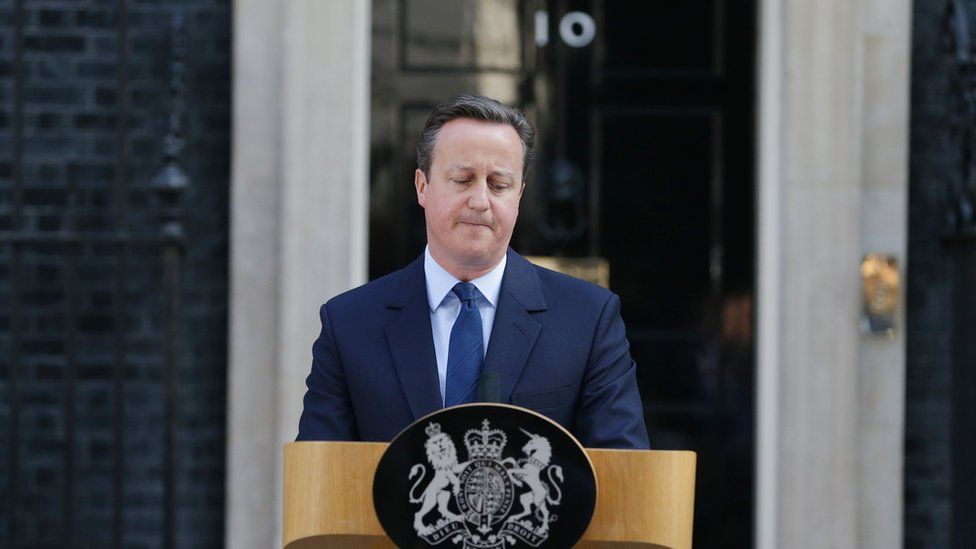EU referendum: Moody's cut UK's credit outlook to 'negative'
- Published

The UK has had its credit rating outlook cut to "negative" by the ratings agency Moody's after the country voted to leave the EU.
Moody's said the result would herald "a prolonged period of uncertainty".
Meanwhile, PM David Cameron is under pressure to speed up "divorce" talks with the EU after Brussels said exit negotiations should start immediately.
EU head Jean-Claude Juncker said it was "not an amicable divorce", but it was "not a deep love affair anyway".
Moody's said, external the referendum result would have "negative implications for the country's medium-term growth outlook", and it lowered the UK's long-term issuer and debt ratings to "negative" from "stable".
Tipped favourite
It added: "In Moody's view, the negative effect from lower economic growth will outweigh the fiscal savings from the UK no longer having to contribute to the EU budget."
It also said the UK had one of the largest budget deficits among advanced economies.
Colin Ellis, chief credit officer at Moody's, told BBC Radio 4's Today programme the UK's credit rating could have an impact on UK households in the long term.
"The government borrowing rate is normally the benchmark - it is the rate at which other interest rates in the economy are set," he said.
"A lower rating would typically correspond to higher borrowing costs, and that would be felt not just by the government but by businesses and households in the longer term."
The financial assessment came after the UK voted to leave the EU in historic referendum on Thursday.
Analysis
By Will Smale, business reporter
Credit rating agencies, in essence, rate a country on the strength of its economy.
More specifically, they score governments (or large companies) on how likely they are to pay back their debt.
The higher a credit rating, the cheaper it is for a country to borrow money in the international markets.
So, in theory, when a government wants to borrow money, a high credit rating means a lower interest rate (and vice versa).
There are three main ratings agencies - Moody's, S&P and Fitch. The last two have yet to issue a comment on the UK post-referendum.
Credit rating agencies also give each country a specific credit rating score. In the case of Moody's and the UK, it currently scores the UK at "Aa1".
This is the second highest rating in Moody's scale, and stands for "high grade", below "AAA" which is "prime".
By changing its outlook to "negative", Moody's has warned that the UK's "Aa1" rating may be at risk of being lowered.
Mr Cameron had urged the country to vote Remain in Thursday's referendum but was defeated by 52% to 48%.
On Friday morning, he stood outside 10 Downing Street alongside his wife Samantha to announce he would remain in place for the short term and then hand over to a new prime minister by the Conservative conference in October.
He said he would attempt to "steady the ship" over the coming weeks and months.
However, the PM said it would be for a new prime minister to carry out negotiations with the EU and invoke Article 50 of the Lisbon Treaty, the formal procedure that will take Britain out of the EU, a process that will take a minimum of two years.
European Commission President Jean Claude Juncker says it is "not an amicable divorce"
But in an interview with German TV, European Commission President Jean-Claude Juncker said: "Britons decided yesterday that they want to leave the European Union, so it doesn't make any sense to wait until October to try to negotiate the terms of their departure - I would like to get started immediately."
He said the EU would pursue a "reasonable approach" in negotiating the separation.
David Cameron spoke to Barack Obama after announcing he would be stepping aside
Earlier, Mr Cameron was given assurances from US President Barack Obama that the UK would remain "an indispensable partner".
In a telephone call, the US leader told Mr Cameron that he regretted the PM's decision to step aside, saying he was "a trusted partner and friend".
A White House spokesman later said Mr Obama "stands by what he said" about the UK going to "the back of the queue" when it comes to trade deals with the US.
He gave the warning while on a visit to the UK during the referendum campaign.
The process to take the UK out of the European Union starts with invoking Article 50 and will take at least two years from that point
The result of the referendum - which saw more than 30 million people turn out to vote - saw British bank shares lose nearly a third of their value before rallying on Friday afternoon.
Retailers and the AA motoring organisation warned that petrol prices were likely to rise by 2p-3p a litre because of the pound's fall against the dollar.
Protesters gathered outside the Houses of Parliament
There were further protests in Downing Street by young people unhappy with the referendum result
Boris Johnson, the leading voice in the Leave campaign is favourite to be the next Tory leader and prime minister, although he has yet to announce his candidacy, with Home Secretary Theresa May also seen as being in the running.
Britain's vote to quit the EU has also prompted fresh calls for Labour leader Jeremy Corbyn to resign, amid claims he did not do enough to convince Labour supporters to vote for Remain.
The referendum result could also trigger a second independence referendum in Scotland, which wants to stay in the EU.
First Minister Nicola Sturgeon said it was "democratically unacceptable" to force Scotland, which voted strongly to remain in the EU, out of the bloc against its will.
A meeting of 27 EU leaders has been scheduled for Wednesday to discuss Britain's exit - but Mr Cameron is not invited.
- Published19 June 2016